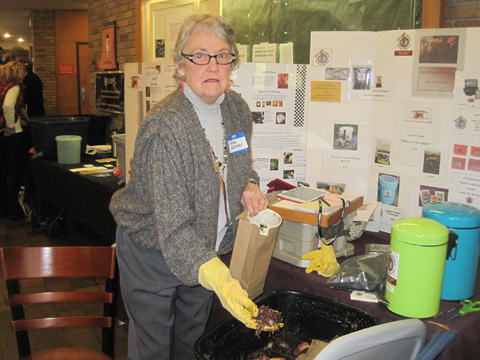
WORM-LADY-IN-CHIEF Warner. |
“It’s not scrap, it’s a goldmine,” says Katherine Brown of the potato peels, coffee grounds, moldy bread, and other gross stuff we routinely shovel into the trash. It’s Monday morning and the former Executive Director of South Side Community Land Trust is leading 130 attendees in a “facilitated brainstorm” to open the Rhode Island Compost Conference and Trade Show at Salve Regina University in Newport. During the session, Charlestown farmer Mike Merner, 64, provides a rallying cry for food composting: “If not now, when?”
In the last 20 years, recycling has become second nature to many, but not so with composting. According to the Natural Resources Defense Council, only three percent of food waste nationally is composted, while the EPA estimates that just five percent of food waste generated by US businesses is diverted from landfills. The 2014 RI Compost Con, the fifth annual event, is out to change that. You might call it the dark, but fertile, underbelly of the glitzier Rhode Island Spring Flower & Garden Show, which attracted thousands of people to the Rhode Island Convention Center last month.
“It’s ‘no fight, no win’ on climate change,” says Sheldon Whitehouse, who provides opening remarks along with Rhode Island Senate President Teresa Paiva-Weed. Composting is important in combating climate change, since food waste buried in landfills receives little oxygen, and thus produces methane — a major culprit in global warming — as it decomposes. Composted scraps, meanwhile, break down quickly, produce little methane, and save landfill space.
One Rhode Island politician leading the composting charge is state rep Donna Walsh (D-Charlestown, New Shoreham, South Kingstown, Westerly), vice-chair of the House Committee on Environment and Natural Resources. Walsh is a conference workshop participant who is also spearheading a house bill that would require non-residential food waste be separated from waste destined for the landfill. The mandate would begin with major institutions like colleges, and apply to all Rhode Island businesses and institutions by 2021. Similar measures have already been passed in Massachusetts, Connecticut, and Vermont. “Rhode Island is behind the curve” on this issue, says conference organizer Greg Gerritt, who makes the connection between sustainability, food security, and a healthy economy. He sees composting as “the only way to get value from food scraps.”
There are barriers to food composting. One is low tipping fees (the price a landfill charges its customers per ton of waste). When it’s cheap to bring garbage to a landfill, there is little economic incentive to divert food waste on a large scale, says Gerritt. For backyard and neighborhood composting, there is also the yuck factor, and rats. But City of Providence Director of Sustainability, Sheila Dormody, says with the use of proper containers and procedures, vermin can be held at bay. And participants in a pilot composting project in the West Broadway neighborhood were not at all grossed out by composting, she explains. The project provided 25 households with compost buckets which they would periodically take to a nearby site for emptying. In answer to the rhetorical question, “How many people in Providence are willing to walk two blocks with food slop?” Dormody says that, in West Broadway, the answer is “a lot.” There was a waiting list to join the program.